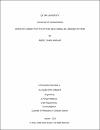An Ontology based Text-to-Picture Multimedia m-Learning System
| Advisor | AlJA'AM, Jihad Mohamad |
| Author | Karkar, Abdel Ghani |
| Available date | 2018-12-20T08:42:17Z |
| Publication Date | 2018-01 |
| Abstract | Multimedia Text-to-Picture is the process of building mental representation from words associated with images. From the research aspect, multimedia instructional message items are illustrations of material using words and pictures that are designed to promote user realization. Illustrations can be presented in a static form such as images, symbols, icons, figures, tables, charts, and maps; or in a dynamic form such as animation, or video clips. Due to the intuitiveness and vividness of visual illustration, many text to picture systems have been proposed in the literature like, Word2Image, Chat with Illustrations, and many others as discussed in the literature review chapter of this thesis. However, we found that some common limitations exist in these systems, especially for the presented images. In fact, the retrieved materials are not fully suitable for educational purposes. Many of them are not context-based and didn’t take into consideration the need of learners (i.e., general purpose images). Manually finding the required pedagogic images to illustrate educational content for learners is inefficient and requires huge efforts, which is a very challenging task. In addition, the available learning systems that mine text based on keywords or sentences selection provide incomplete pedagogic illustrations. This is because words and their semantically related terms are not considered during the process of finding illustrations. In this dissertation, we propose new approaches based on the semantic conceptual graph and semantically distributed weights to mine optimal illustrations that match Arabic text in the children’s story domain. We combine these approaches with best keywords and sentences selection algorithms, in order to improve the retrieval of images matching the Arabic text. Our findings show significant improvements in modelling Arabic vocabulary with the most meaningful images and best coverage of the domain in discourse. We also develop a mobile Text-to-Picture System that has two novel features, which are (1) a conceptual graph visualization (CGV) and (2) a visual illustrative assessment. The CGV shows the relationship between terms associated with a picture. It enables the learners to discover the semantic links between Arabic terms and improve their understanding of Arabic vocabulary. The assessment component allows the instructor to automatically follow up the performance of learners. Our experiments demonstrate the efficiency of our multimedia text-to-picture system in enhancing the learners’ knowledge and boost their comprehension of Arabic vocabulary. |
| Language | en |
| Subject | Multimedia Systems Text-to-Picture Conceptual Graph Ontology Visualization Learning Technology Mobile Learning |
| Type | Dissertation |
| Department | Computer Science |
Files in this item
This item appears in the following Collection(s)
-
Computing [111 items ]


